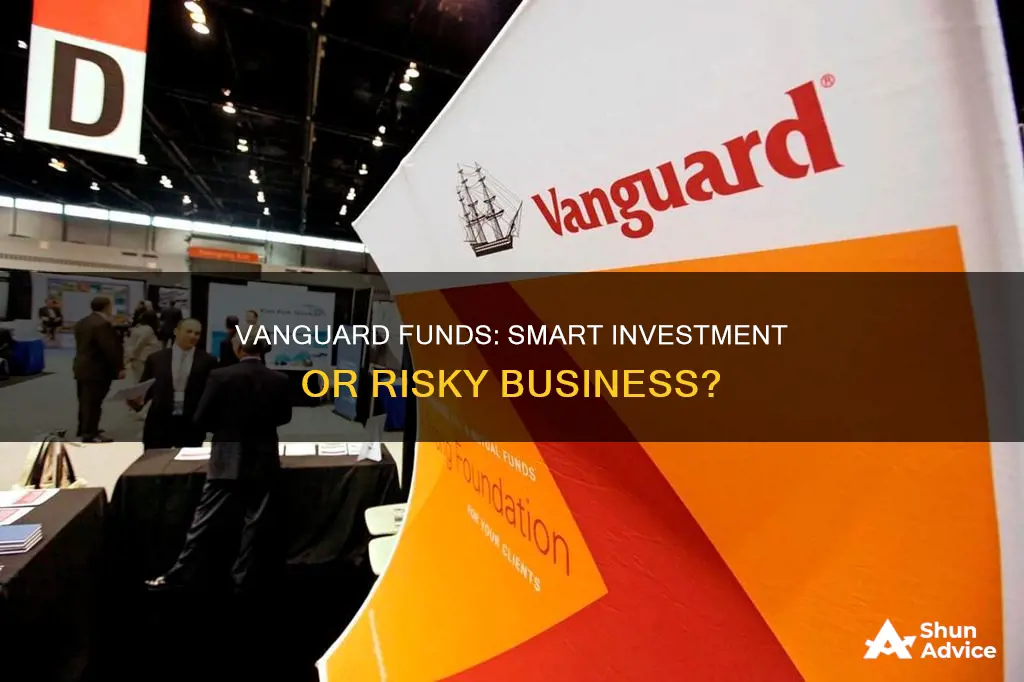
Investing in Vanguard funds is a good option for those seeking a long-term, low-cost investment strategy. Vanguard is known for its low-cost funds and large fund selection, making it ideal for investors looking to implement a buy-and-hold strategy with minimal fees. The company offers a wide range of investment options, including mutual funds, exchange-traded funds (ETFs), stocks, and bonds.
Vanguard's average expense ratio across its mutual funds and ETFs is significantly lower than the industry average, with Vanguard's average at 0.08% compared to the industry average of 0.44%. This means that investors keep more of their returns, which can add up to substantial savings over time.
Additionally, Vanguard's investment options provide built-in diversification, reducing investment risk. Their funds can invest in hundreds or even thousands of individual securities, so if one security performs poorly, the others can help offset the risk.
For those seeking a more hands-off approach, Vanguard also offers a robo-advisor service and financial planning services. Their target retirement funds are particularly attractive, as they automatically adjust the asset allocation to become more conservative as the target retirement date approaches.
However, it is important to note that Vanguard's trading platform is basic and may not offer the analytical and educational tools desired by active traders. Additionally, Vanguard funds typically have investment minimums, with many funds requiring a minimum initial investment of $3,000.
Overall, Vanguard funds are a good option for long-term investors seeking a low-cost, diversified investment strategy, but active traders may find the platform lacking in certain features.
| Characteristics | Values |
|---|---|
| Investment options | Stocks, mutual funds, ETFs, options, bonds, CDs |
| Number of apps | Two: Website and mobile app |
| Available for | iOS and Android |
| Number of tools | Two: Argus and Market Grader |
| Customer support | Phone support Monday to Friday, 8:00 a.m. to 8:00 p.m. Eastern; email support |
| Account fees | Annual fee: $25; Inactivity fee: $0; Outgoing transfer fee (partial or full): $100 |
| Interest rate on uninvested cash | One of the highest rates of any broker |
| No-transaction-fee mutual funds | Over 3,600 |
| Mutual funds | Over 160 |
| ETFs | Over 80 |
| Average expense ratio | 0.08% (Industry average: 0.44%) |
| Investment minimums | $1,000-$3,000 |
What You'll Learn

Vanguard's low-cost funds
Vanguard is a leading provider of low-cost exchange-traded funds (ETFs) and mutual funds. The average Vanguard mutual fund and ETF expense ratio is 82% less than the industry average. As of December 31, 2023, Vanguard's average mutual fund and ETF expense ratio is 0.08% compared to the industry average of 0.44%.
ETFs:
- S&P 500 ETF (VOO): One of Vanguard's lowest-cost ETFs with a 0.03% expense ratio. It seeks to track the performance of the Standard & Poor's 500 Index and has returned 15.93% annually over the last five years.
- Total Stock Market ETF (VTI): Vanguard's oldest and largest ETF with $1.5 trillion in assets under management (AUM). It covers the entire U.S. stock market with a low fee of 0.03%.
- Total Bond Market ETF (BND): Offers broad exposure to the fixed-income market with an expense ratio of 0.03%. It holds 11,107 bonds in its portfolio, including Treasury/agency bonds, government mortgage-backed bonds, and industrial bonds.
- Growth ETF (VUG): Invests in stocks of large companies with high-growth potential and charges an expense ratio of 0.04%. It has returned 15.54% annually over the last 10 years.
- Large-Cap ETF (VV): Invests in stocks representing the largest companies in the U.S. stock market with an expense ratio of 0.04%. It holds more than 510 stocks in its portfolio, with an average market cap of $211.1 billion.
Mutual Funds:
- Total Stock Market Index Fund Admiral Shares (VTSAX): Tracks the CRSP U.S. Total Market Index and features a portfolio of more than 3,600 domestic equities. It has a low 2.2% turnover rate and a 0.04% expense ratio. The minimum initial investment for this fund is $3,000.
- 500 Index Fund Admiral Shares (VFIAX): A low-turnover fund that tracks the S&P 500. It is limited to 500 large- and mid-cap stocks and has a 0.04% expense ratio.
- Total International Stock Index Fund Admiral Shares (VTIAX): Tracks more than 8,600 stocks represented by the FTSE Global All Cap ex U.S. Index. It has a low turnover rate of 3.9% and a 0.12% expense ratio, with a minimum investment requirement of $3,000.
- Total World Stock Index Fund Admiral Shares (VTWAX): A globally diversified equity index fund that tracks the FTSE Global All Cap Index, holding more than 9,900 stocks from U.S., international developed, and emerging markets. It has a low portfolio turnover of 4.3% and reasonable expense ratios of 0.1%.
- Value Index Fund Admiral Shares (VVIAX): A fund that targets the "value" factor, which refers to the historical outperformance of stocks with high book-to-market ratios. It tracks 340 stocks represented by the CRSP U.S. Large Cap Value Index and has a 0.05% expense ratio and a 10.3% portfolio turnover rate.
Income Funds: A Guide to Smart Investing
You may want to see also

Vanguard's broad market indexes
Vanguard is a good choice for investors looking for low-cost funds and a trusted name to park their retirement funds and forget about them. Vanguard is the leader in low-cost mutual, index, and exchange-traded funds. Its average expense ratio is 0.09%, significantly lower than the industry average of 0.36%.
- Vanguard Total Stock Market Index Fund Admiral Shares (VTSAX): Tracks the CRSP US Total Market Index, investing in over 3,600 domestic equities across all market sectors and cap sizes. It has a low turnover rate of 2.2% and an expense ratio of 0.04%. The minimum initial investment is $3,000.
- Vanguard 500 Index Fund Admiral Shares (VFIAX): Tracks the S&P 500, with a limited portfolio of 500 large- and mid-cap stocks. It has a low turnover rate and an expense ratio of 0.04%.
- Vanguard Total International Stock Index Fund Admiral Shares (VTIAX): A broad-market approach to international stocks, tracking over 8,600 stocks from the FTSE Global All Cap ex US Index, including developed and emerging markets. It has a low turnover rate of 3.9% and an expense ratio of 0.12%, with a minimum investment requirement of $3,000.
- Vanguard Total World Stock Index Fund Admiral Shares (VTWAX): A globally diversified equity index fund that tracks the FTSE Global All Cap Index, with over 9,900 stocks from US, international developed, and emerging markets. It has a low turnover rate of 4.3% and reasonable expense ratios of 0.1%.
These broad market index funds from Vanguard offer a passive and low-cost investment strategy, making them attractive options for long-term investors.
Laser Fund Investment: Strategies for Success
You may want to see also

Vanguard's ETFs vs. mutual funds
When deciding whether to invest in Vanguard ETFs or mutual funds, it's important to understand the differences between the two. While both are professionally managed collections of individual stocks or bonds, there are some key distinctions to consider:
Similarities between Vanguard ETFs and Mutual Funds:
- Both offer built-in diversification, reducing risk and potential losses.
- They both provide access to a wide range of U.S. and international investment options to suit various investment goals and styles.
- They are overseen by professional portfolio managers who choose and monitor the investments, ensuring they align with their target indexes.
- Both are commission-free when bought and sold online through a Vanguard Brokerage Account.
Differences between Vanguard ETFs and Mutual Funds:
- Vanguard ETFs have lower investment minimums, allowing purchases for as little as the price of one share. In contrast, Vanguard mutual funds often have minimum initial investments of $3,000.
- ETFs provide real-time pricing and allow for more sophisticated order types, giving investors more control over the price of their trades.
- Mutual funds offer the convenience of automatic and regular investments or withdrawals, which is not available with ETFs.
- ETFs can be bought and sold throughout the day, like stocks, offering greater flexibility. Mutual fund shares, on the other hand, are priced only once per day at the end of the trading day.
- ETFs generally carry lower expense ratios than their mutual fund counterparts, but they must be traded in a brokerage account and may incur brokerage commission fees.
When deciding between Vanguard ETFs and mutual funds, investors should consider their investment goals, desired level of control, and whether they prefer a buy-and-hold or active trading strategy. ETFs may appeal to those seeking lower minimum investments and more control over transaction prices, while mutual funds are ideal for those who want to set up automatic investments or withdrawals.
Pension Funds' Investment Choices: What, Why, and How?
You may want to see also

Vanguard's ESG funds
Vanguard is a good choice for investors looking for low-cost funds, especially for those with a buy-and-hold strategy and a long investment horizon. The company has a solid reputation for its well-below-average expense ratios on its index funds and exchange-traded funds.
- ESGV ESG US Stock ETF: An indexed fund with approximately 1,500 stocks.
- VFTAX FTSE Social Index Fund: An indexed fund with approximately 500 stocks.
- VSGX ESG International Stock ETF: An indexed fund with over 6,000 stocks.
- VCEB ESG US Corporate Bond ETF: An indexed fund with over 2,700 bonds.
- VBPIX Baillie Gifford Global Positive Impact Stock Fund: An actively managed fund with approximately 25-50 stocks.
- VEOIX Global Environmental Opportunities Stock Fund: An actively managed fund with approximately 25 stocks.
- VEIGX Global ESG Select Stock Fund: An actively managed fund with approximately 40-50 stocks.
When considering whether to invest in Vanguard funds, it is important to keep in mind that Vanguard's trading platform is basic and may not offer the analytical and educational tools that some investors require. Additionally, Vanguard funds typically have investment minimums, with many funds requiring a minimum initial investment of $3,000.
Mutual Fund Safety: Diversification and Risk Mitigation
You may want to see also

Vanguard's robo-advisor
Here's how it works: when you first sign up, the robo-advisor will ask for basic information about your goals, risk tolerance, and investment time horizon. It will then use this information to suggest a diversified portfolio and automatically invest your money accordingly. Over time, it will continue to manage your investments and periodically rebalance your portfolio to ensure your asset allocation stays on track.
Vanguard Digital Advisor charges an annual gross advisory fee of 0.20% for an index portfolio option or 0.25% for an active portfolio option. However, this fee may be reduced by a credit for revenue retained from investments in each enrolled account, resulting in a lower net advisory fee. The net advisory fee will vary based on your unique asset allocation, account type, and specific holdings.
The service has a minimum investment requirement of $100 in each Vanguard Brokerage Account. It can manage eligible 401(k) retirement accounts and certain types of retail Vanguard Brokerage Accounts, such as individual or joint tenants with rights of survivorship (JTWROS) taxable accounts and inherited IRAs owned by natural, adult investors.
Vanguard Digital Advisor offers several benefits, including tax-loss harvesting, a debt payoff calculator, and the ability to connect to non-Vanguard accounts for a more holistic view of your financial situation. However, it may not be suitable for experienced investors who want more control over their portfolio or those with investments at other financial institutions, as it offers limited investment choices and may not be able to manage all account types.
Mid-Cap Funds: Worthy Investment or Risky Business?
You may want to see also
Frequently asked questions
Vanguard is a leader in low-cost investing, making it ideal for long-term investors. Their average expense ratio is 82% lower than the industry average. Vanguard also offers a wide range of investment options, including stocks, mutual funds, ETFs, and bonds.
It depends on your investment goals and risk tolerance. Vanguard offers a variety of funds, including index funds and actively managed funds, so you can choose the one that aligns with your goals and risk profile.
The minimum investment for Vanguard funds varies, but it can range from $1,000 to $3,000 for mutual funds and as little as $1 for ETFs.
You can buy Vanguard funds through a Vanguard Brokerage Account or another broker. Vanguard offers commission-free online trading for ETFs and mutual funds.
As with any investment, there is a potential risk of losing money when investing in Vanguard funds. The value of your investment can go down as well as up, and there is no guarantee of positive returns.







